As an amateur scholar and die-hard enthusiast of everything to do with Alice in Wonderland, I have launched a podcast that takes on Alice’s everlasting influence on pop culture. As an author who draws on Lewis Carroll’s iconic masterpiece for my Looking Glass Wars universe, I’m well acquainted with the process of dipping into Wonderland for inspiration.
The journey has brought me into contact with a fantastic community of artists and creators from all walks of life—and this podcast will be the platform where we come together to answer the fascinating question: “What is it about Alice?”
For this episode, it was my great pleasure to have Tom Schulman join me as my guest on this episode! Read on to explore our conversation and check out the whole series on your favorite podcasting platform to listen to the full interview.

FB
Let’s talk about the Writers Strike and the work you did on the negotiating committee. Our friend Ed Dector told me that you got a standing ovation for the work that you guys did, and the concessions that you got from the studios. What do you think? How do you think that's going to translate moving forward? I believe you guys ratified it yesterday. It seems universal that you guys came out on top with almost all of the items that you were looking for.
TS
Obviously, you never get everything you want but I would say we got the vast majority. We certainly got something in every area we were asking for, which is unusual. There was nothing we put on the table that we didn't make gains with. We didn't leave any of the writers behind. As often happens with these negotiations, the companies figure out the comedy-variety writers are a very small minority of the Guild so the Guild would never hold out just for the comedy-variety writers so they tend to not give them anything, and the people who are making the deal, the negotiators for the Guild, essentially have to leave them behind. But that didn't happen this time.
FB
What I've been hearing, though, is that the producers are going to be looking for smaller budgets. Which makes some sense because they were running rampant with their production costs. How do you think that's going to affect the writers and the deal they have moving forward?
TS
They’ll blame it on us, of course, they'll blame it on the WGA strike and the SAG strike. But this was happening anyway so I don't really think it's strike related. If anything, the strike was an opportunity for the companies to all contract at the same time, which is hard for any one company to do. It made it easier for them to all say, “Netflix has to contract, we all have to do it”. This was something that was coming.
FB
Your latest film, Double Down South, is a high stakes gambling movie about keno pool. I've known you for a very long time and you've written some amazing movies, but can you describe writing a script that you know you're going to direct? Is the framework a little bit different?
TS
No. I write everything as if I were directing it as if I were making the movie on the page. To the extent that I feel like I need to describe things if it were just a script for me, maybe I'd leave those things off. But it's gonna go out to artists, crew, actors, and so forth so it needs to read exactly the way a regular script would read.
FB
This story is really about an outsider breaking in. That’s a very popular trope, especially if you do it well. What do you think it is about the underdog story that resonates with viewers?
TS
We are all in that situation at some point in our lives, at least most of us. People can relate to those feelings of being on the outside looking in and having to struggle to find your way in a world that is not as familiar as it hopefully will be at some point. That sense that everybody knows everything about this except you so you've got to somehow find your way through all that.
FB
Describe the movie for the listeners. I didn't know anything about keno pool until I came to your screening. What was the inspiration?
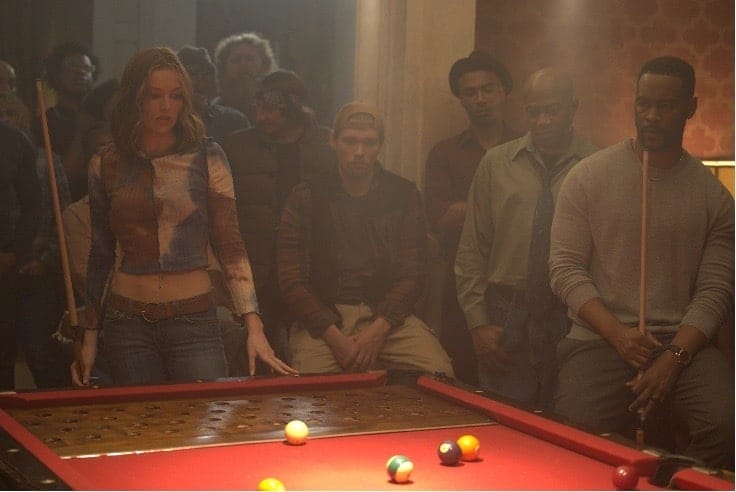
TS
The inspiration was that I used to play that game back in my youth when I would visit pool halls. It's an unusual game. It lasted about 100 years from the early 20th century to the end of the 20th century and it was banned in 17 states because it was such an intense gambling game. They put a very thin board on the top quarter of the table and the board has holes drilled in it for every ball in the pool rack and a double hole in the middle. There’s a little ramp up off the felt of the table onto the keno board and the board is very, very smooth. The holes in the board are drilled precisely, so unless you hit the hole exactly, the ball will loop out. It's by far the hardest shot in pool, there's nothing that even approaches how difficult it is to get a ball in its hole.
What's diabolical about the game is this double hole. If you make a double on the break, the bet doubles, and you get paid double, and you get to break again. If you double on that break, the bet doubles again, and so forth. So, a novice, like I was the first time I played, can get into real trouble. The first time I played it, the guy who had won before it got to break and made a double. I got ready to give him $1, which was a lot of money to me at the time, and he said, “No, you don't understand you owe me $2. It's double.” So, I gave him another dollar. He makes another double and he said, “That'll be $4.” And I'm like, Oh my God, $4. I said, “If you win on the break again, do I owe you $8?” And he said, “You're a smart kid.” I said, “Well, I don't have $8.” He said, “Well you got that watch you're wearing.” Fortunately, he missed and I got ready to shoot, and somebody if I missed it’d be his turn again and then it starts all over. So, the first time I played I didn't get to shoot.
FB
So, you really didn't play.
TS
There was this woman who came into the pool hall every so often and played keno with all those guys. I was fascinated by her and made some notes very early in my career about her and then just forgot about it. Then right when COVID hit, I was thinking about what to do and I remembered her. I started making notes and then the story came to me about this woman who's trying to make it in the man's world of keno pool, which in this case is played at a falling apart plantation house way out in the sticks in Georgia, where the best come to play keno pool.
FB
What was terrific about it was the blending of suspense and drama with some comedy. What were you striving for in terms of tone for this film?
TS
I worked from story first. Story will give you those elements of tone but I think there's always humor in any story because the interactions between people are going to create that. But those things give themselves to you as you write, staying on story, figuring out the dynamics between the characters, and so forth. As the story evolves to get to the ending is really all I do, and the humor just hopefully comes in the middle of that process.
FB
How was getting back in the director's chair after many, many years?
TS
It was scary. Years ago, when I made 8 Heads in a Duffel Bag, which I know bazillions of people haven't seen, you deal with things like lack of sleep, feeling like you're playing chess with the universe every day because the elements change so abruptly. You’re constantly rewriting for that sort of thing. So that really worried me and the lack of sleep on 8 Heads in a Duffel Bag was just a killer. I was getting three, or four hours a night and getting pretty frazzled. Some of the difficulties making that movie just made me really afraid to direct again. But this time, we had a great crew and a great cast. I still only got four hours of sleep, but I was never tired.
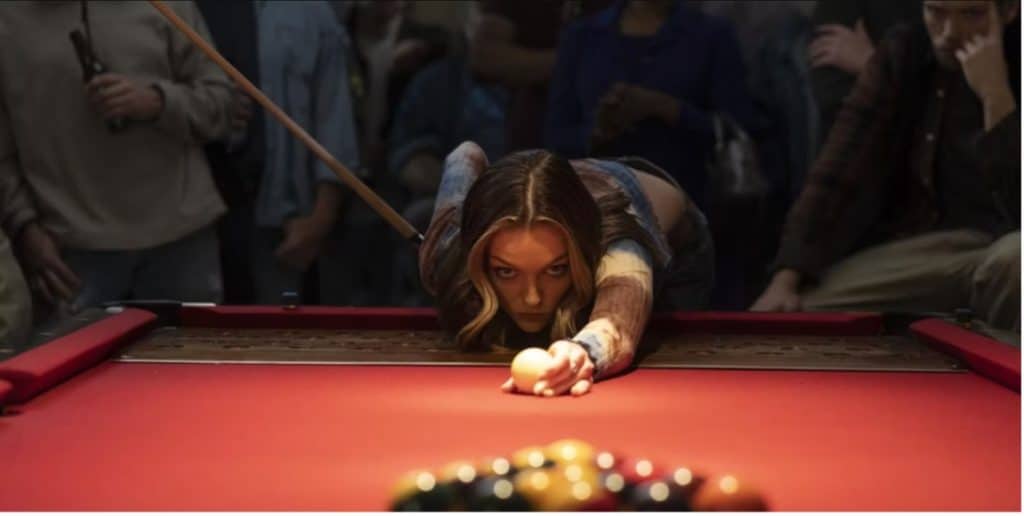
FB
But Double Down South is an independent film so it was a little smaller than 8 Heads in a Duffel Bag, which was a studio movie, so you probably had more freedom on this one. But then with independent films, you have all these budgetary restrictions, which is what I confronted with Wicked. It was really fun to be making the movie and making the moves wherever you needed to make them but it was mistake after mistake and they compounded each other. On the studio movie, you have all these resources, and you have longer days and more staff and crew. So how did that play out in terms of the budget and the number of days and how you could make your days?
TS
It was really scary. We had nothing in the budget for overtime. You’re shooting a day and when that day is over, you're out for the day and if you can't get this done in 22 days, without overtime, then start figuring out what you can jettison.
FB
What happened on locations where you had to move and you were trying to get shots? Did you ever have to reduce the amount of coverage or did you get really creative?
TS
We were really only in three locations, the interior of the plantation house was one location, the exterior was several hundred miles away in South Carolina and we shot it in Georgia, and then the third was pretty close to that house in South Carolina. So, when we moved to South Carolina for the last four days of the shoot, it was pouring down rain, which is great for the atmosphere but hellish when you're trying to shoot, and we had shots with moving cameras on cars, and the lens just got soaked. Fortunately, I had a cinematographer, Alan Caudillo, who has to be one of the fastest in the business. We’d be talking about whether I’d gotten all the coverage I needed on one side of the room and Alan would say, “Don't even think about it. Let’s flip it and if you need something else, I can turn it back around in about four minutes.” That was a huge help. He had a great look at the same time. I also had a whole assistant direction department who would say, “Unless we bother you, you're doing fine.” They took a lot of pressure off and it was terrific to not have people hitting their watches and going “We're in trouble,” more than twice throughout the whole shoot.
FB
You also had a good friend in Kim Coates as the star, a friend of ours who we've golfed with for many, many years. I'm assuming based on what you just said, the schedule didn’t allow you guys to play any rounds of golf during the shooting. But Kim, as a good friend, I'm sure was a great collaborator.
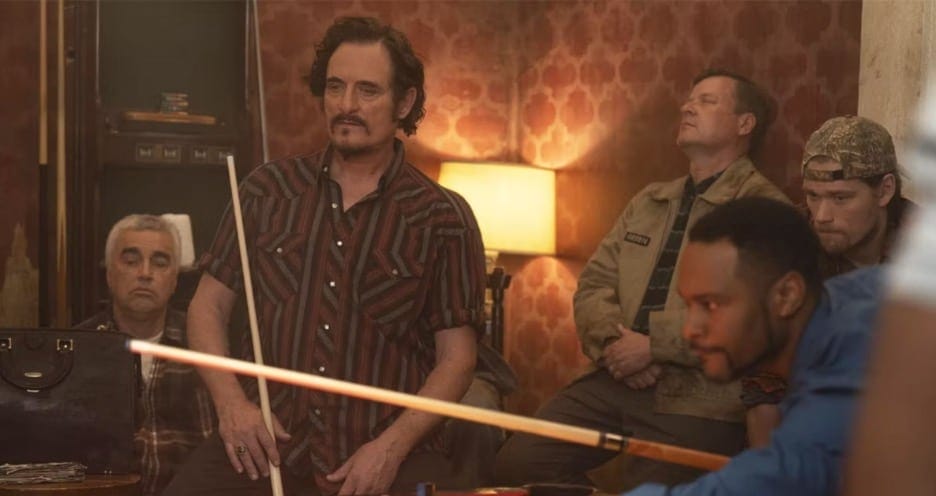
TS
Kim was a prince and we had four or five days of rehearsals, which you sort of have to have in a movie like this. If we had had to spend time each morning during the shoot figuring out the scene and rehearsing it, we would have never made it on that schedule. So, a week of rehearsals allowed us to make the movie in the way we did and Kim was 100% there the whole time. The actors all stayed in the same Victorian bed and breakfast and bonded, which helped to create the dysfunctional family that is in the movie.
FB
You discovered the lead actress, Lili Simmons, right?
TS
She had already been discovered to a certain extent. She had a big part in a series called Banshee, a really terrific show which was not as successful as it should have been. She’s been working since she was 18 or 19 years old and has done a lot of great stuff.
FB
She really did an amazing job and captured the essence of that sense of the outsider in that character. And she really pulled off the pool playing.
TS
Our friend Matt Craven, is an actor and also a phenomenal pool player, volunteered to spend as much time as necessary to teach her how to play pool. They played every day for a couple of weeks and she got pretty good. She made a couple of doubles.
FB
You went on a film festival tour and won the Audience Award for Best Feature at the Omaha Film Festival and the Jury Award for Best Feature at the Cordillera International Film Festival. Congratulations. What was that like?
TS
It’s so exciting. In this day and age, it's not typical to even get to see your movie with an audience at all. In this case, I've seen it at five or six festivals, and it's really fun to see a crowd react to the movie.
FB
Years ago, when I read the script for 8 Heads in a Duffel Bag, it made me laugh out loud, and I thought it was going to be really successful. Then you had a really difficult experience. What happened on that movie in terms of, the little 1000 cuts that took away from the vision you had originally created in the script, which felt so funny and vibrant? Was it a casting thing?
TS
We cast a part that was not the lead first, over my objections and way early. To make a cast work, you're always making sure that chemistry is right. We might have cast Andy Comeau, who plays the lead, anyway but we ended up casting opposite this other character. Ultimately, that was driving all the decisions about not only the casting but the writing, which had to change to accommodate the casting. It was infuriating and quite obvious to me that you cast your lead first and then everybody else is in orbit around the lead. I would say that was the biggest mistake.
FB
I think people are interested in why movies turn out so bad. The point is you make these early choices and you can't catch up. I mean, I think it was Hitchcock who said, “90% of a successful movie is casting.” So, you had a 10% chance and that's really unfortunate. Then I guess because you're a first-time director, people feel like they have more leverage and power over you. But then you're the one who's in director jail as if you made all these creative mistakes and you don't get to direct a movie for 10 years.
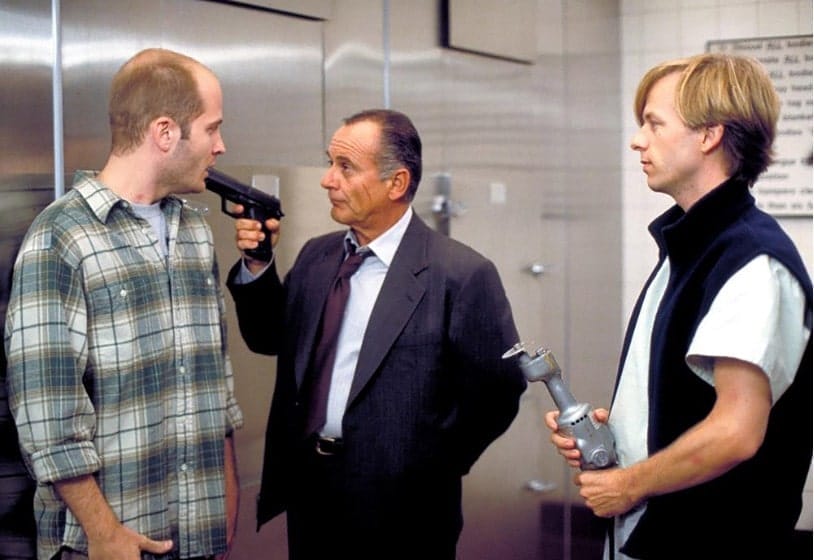
TS
I remember the night after the movie premiered and the studio, Orion Pictures, pretty much dumped it because they sold itself to MGM two weekends before we opened. On the Monday before the movie opened, I got a call from the head of marketing at Orion, who said, “I just want to say I'm sorry. I can't tell you right now, but you’ll know by the end of the week.” It was really painful. Then of course, the morning after it opened, my phone rang at 4:30 in the morning and it was my ex-agent who said to me, “Schulman. Five years.” And I said, “What do you mean?” He goes, “Director jail. Five years.”
FB
That’s terrible. Let's go back to when you first came into the business because you had a really crazy successful run in the late 80s and early 90s. Is it true that Dead Poets Society was your first produced movie?
TS
I had written two movies that I sold as spec scripts that ended up being made at ABC as movies of the week and bear very little resemblance to what I wrote. Then I sold a script called Love at Second Sight about a psychic detective agency solving crimes that haven't been committed yet. But that got eviscerated too and just plummeted into the ocean maybe six months before Dead Poets came out. My parents came out here and we went to a screening of Second Sight at Warner Brothers. In the end, my dad just leaned over to me and said, “You better find something else to do with your life.” Well, well, wait,
FB
Tell me about your mom and dad and your writing and your aspirations versus theirs. What did that look like at the dinner table?
TS
My parents were great about that. My dad was a doctor and I had gone to college as pre-med. I was doing well and I said to Dad, “I think I'm gonna go ahead and commit and go to medical school.” He said, “You grew up with me as a doctor. Do you really want to do that? Did you pay close attention to what my life was like, in the early days, and how little I saw of you? I've loved part of it, but I haven't loved it all. Think about it.” And I thought to myself, “Maybe I don't really want to do this.” So, two, three years later, when I started getting interested in making movies, they were like, “Writer? Director? You've never been a particularly good writer. You make Bs on your essays. But if that's what you want to do, give it a shot.”
I got into USC film school and came out here and was kind of too cool for school and quit. And they were like, “What's going on? What's happening with you out there?” It was a dozen years of being in the wilderness, waiting for something to happen. My parents were supportive and worried at the same time.
FB
Let’s talk about those dozen years and where story comes from and the ideas you mentioned at the top of the show. At the beginning, what was coming to you in terms of things that you thought would make good movies?
TS
I started writing horror films. I had gotten very lucky that after I quit USC, I was sitting on a wall trying to figure out what to do and this guy walked up to me and said, “Little Tommy Schulman? I was a teacher at your high school. I heard you were out here.” I told him what was going on so he sent me to a place called the Actors and Directors lab that was run by Jack Garfield, who had been a theater and film director, and brilliant teacher, and I enrolled in that workshop the next day. The first class I was at, I was sitting in the back just trying to figure out what the hell was going on and one guy walked in and said, “I just got a contract to make 75 educational films over the next three years and I need a crew. Anybody in here done that?” I had worked making commercials in Nashville so I raised my hand and I had a job for the next five years. We’d make the film in three weeks, take two weeks off, then do it again.
So, I had two weeks in between every cycle to write and about two years into it, his wife met some people who wanted to finance a low-budget movie. He came in one Monday and said, “I need a script by Friday. Can anybody write a script by Friday? I'll pay you $5,000.” I raised my hand and they asked what I wanted to do. I said that if we were gonna make a low-budget movie, let’s make a horror film. He said, “How about a mummy movie?” So, I wrote a script called Sarcophagus about this mummy that is brought to a university atrium. It was pretty scary and my boss liked it but the backers were Mormons and said they couldn’t back a horror film. Eventually, they came to me and said they liked the script, they just couldn't do it but they offered to pay me to write another movie. So, I wrote a script called Mondo Jocko with my friend Paul Davidson, which was sort of Kentucky Fried Movie or Everything You Want to Know About Sex but in the world of sports. The Mormons loved it and they let me shoot a day of it as a test. But the night after they screened it, the lead producer died of a heart attack, and long story short, it never got made. But now I had this little horror film Sarcophagus and Mondo Jocko as sample scripts. I sent them out and ended up getting an agent, Bettye McCartt, who, as it turned out, was one of the important people behind the scenes in the making of The Godfather. She was Al Ruddy’s assistant at Paramount and she knew the ropes at the studio. Anyway, she became my first agent. Then it was writing spec scripts, mostly thrillers, horror films, and stuff like that.
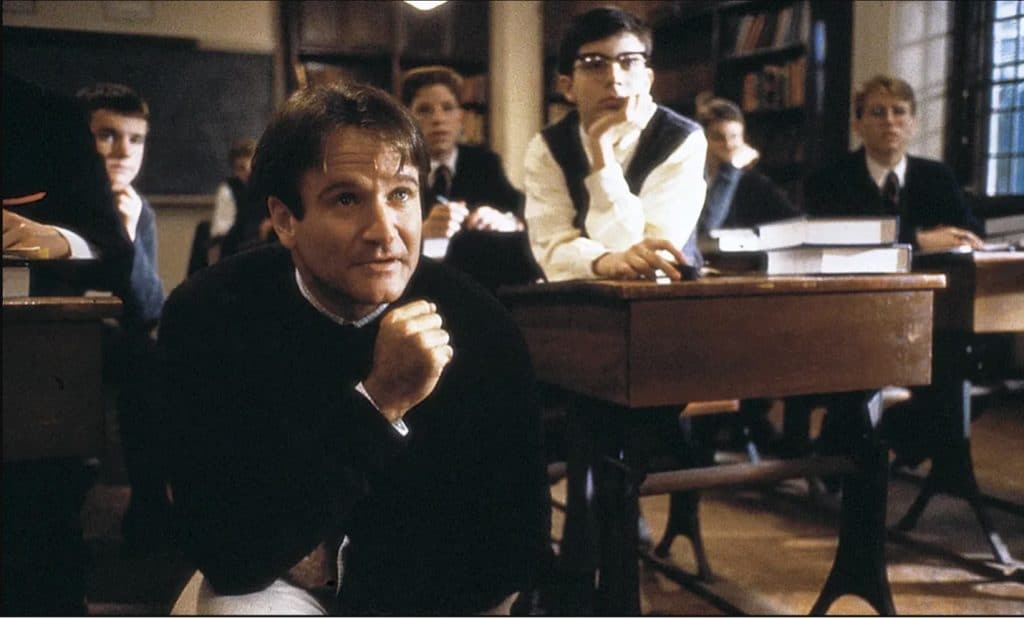
FB
You’ve had a number of comedies like What About Bob? and Honey, I Shrunk the Kids. But then you had this major drama, Dead Poets Society, that you won an Academy Award for. After that, did the folks in town want you to write other dramas? How did that all work?
TS
They wanted comedies. Honey came out a few weeks after Dead Poets came out and Honey made more money and was more reproducible. They consider movies like Dead Poets Society, as a kind of one-off, so if you have another idea that sparks them or really hits them in the gut, they'll do it. But they wanted more comedies, more mass-market comedy.
FB
Did you have an actor in mind when you were writing Dead Poets Society? Or was it just the story, as you said earlier?
TS
That story started working its way into my brain in the late 70s, early 80s. I had a girlfriend and we would go out for sushi many nights a week, and I would start telling her about that story. She kept saying, “Keep working on that. I love that teacher.” I wrote a draft in maybe 1983 and it was all about the teacher and it didn’t work so I put it in a drawer. Two years later, I woke up and went, “Oh, it's about the students. It's about his effect on the students.” And then the story started to really put itself together.
My agent sent it to Steven Haft in the early going. Steven had made a movie with Robert Altman and was trying to get stuff made. He read it and liked it and then nothing happened. What happened was a director named Jeff Kanew had a deal at Disney to make a musical. He was looking for somebody to write an ensemble movie and an agent sent him Dead Poets Society. He called back and said, “I don't want to make this musical anymore. I want to direct that.” So, the studio bought it for him. Then came the problem of casting it, his ideas and theirs were different. He couldn't get Robin Williams at the time to say yes. Robin wouldn't say no but he supposedly had some misgivings about the director, which turned out to be true. But anyway, it didn't work. So, Disney eventually gave him the chance to set it up somewhere else with other actors who were not well known. He couldn't get that done and then it reverted to the studio and they eventually got Peter Weir to direct it.
FB
How lucky all of these little steps along the way were to get to the final product, which won the Academy Award for you.
Were you on the set rewriting because Robin Williams was so known for improvising? How was all that managed?
TS
The bizarre thing was that, from the first day, Robin was always so on script. He knew it word for word. It just didn't have any life to it. I was panicking and we only had Robin for one day and then he was going off to do a play in New York for two weeks, and then we would get him back. I was standing by Peter after each day going, “Oh, my God.” And he goes, “I know, I know. Just be quiet. We'll fix it.” And nothing happened. So, Robin left, and I said to Peter, “What are we going to do?” He goes, “We got two weeks to figure it out.” So, when Robin got back to set, Peter had him do an improvisation. We were in the classroom and improv was, “If you wanted to teach these kids something, what would you teach them?” He decided to do Shakespeare and he did that improvisation that's in the movie where he's John Wayne doing Macbeth. As soon as Robin was improvising, he understood what he was not doing with the script, which is that the dialogue is just like stand-up, you're looking at the kids to see if they’re getting what you want. You're teasing them, you’re cajoling, and doing all that stuff. He just got it immediately after that and it was full of life, and problem solved.
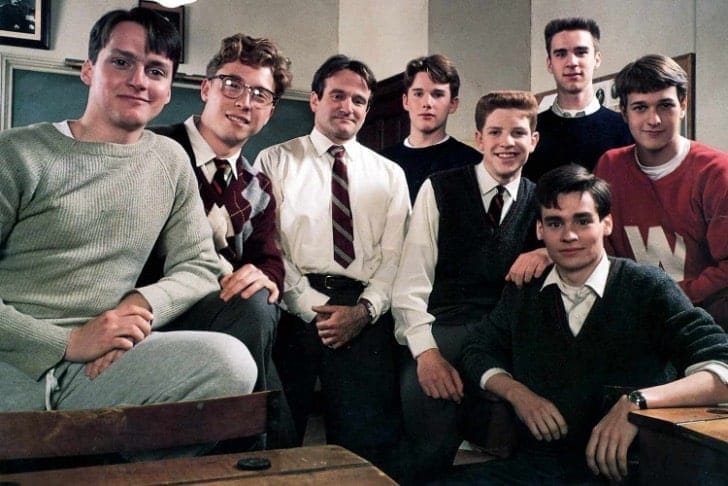
FB
When you were talking with your girlfriend and you were working on the character, in the original script, how much of your history is in it? Because it's a movie that's about nonconformity. Your father actually pushed you away from following the path of conforming to what he did. It seems like those two came together to, at least mathematically, really tell a personal story.
TS
I write to understand what I think. That’s what happened here. You just start writing this teacher and pretty soon you figure out what he's about. I always knew he would be in this tightly wound institution. The rebellion against that environment came naturally.
FB
And the casting of the of the students was really magnificent. They all felt so lived in. Your characters often feel lived in. How do you get to that point? What are you thinking, and trying to create that has that feeling? Because they were some of the most lived-in teen characters that I've ever seen in cinema.
TS
It’s partly the writing and partly the direction and the casting. From the writing standpoint, once I understand the function of a character in a story, I cast around in my mind for people I know from my life. It could have been somebody in kindergarten or in college or after college, but who do I know that would fit the role of that character? Enough that I can put their face and their person in that character. Every character is cast out of my life that way. They’re behaving the way I think they would behave, and maybe that gives it more life.
FB
You did take acting classes for a while. I'm assuming you were taking acting classes not as much to become a great actor but to improve your writing or directing and how to work with actors.
TS
I understood the mechanism. I certainly did not have the courage or the sense of freedom to be able to just let go in front of even the small audiences we had. When I started the Actors and Directors lab, I told Jack I wanted to direct and he said, “Then you're gonna have to act.” That was forced on me and for good reason because the process of acting and the process of writing and directing they're all very connected.
FBIndecent Proposal was an unusual development process in terms of you didn't write it, but you optioned the book.
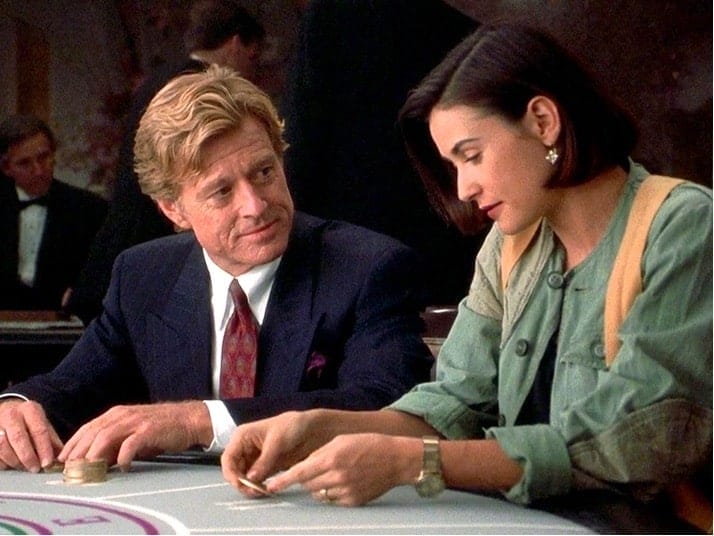
TS
My next-door neighbor was Alex Gartner, who at the time was working for a company that was making an early version of The Handmaid’s Tale. Alex was reading Indecent Proposal, and he would come over every morning at like seven to play ping-pong for an hour before he went off to work. And we would talk about the book while we played. The basic premise of the book is a billionaire paying a woman a million dollars for one night. It seemed like a really interesting idea, but the way it was worked out in the book, not so much. Alex and I had optioned the book for next to nothing and I took it to Teddy Zee at Paramount, who was a junior executive there, and Teddy loved it and bought it. Alex and I both thought we needed a woman writer for the project, it should be told from the woman's point of view. So, we hired Amy Holden Jones to adapt the novel. By the time we turned in the script, Teddy had moved to Sony, the regime who bought it were no longer there, but the new guys really wanted to make it.
They inadvertently tipped their hand as to how much they wanted it because they didn’t know that they owned it when we turned in the script. So, they called me on Monday and said, “Oh my God we have to have this. What do we have to pay for this?” So, just being kind of impish I said, “Well, I'm gonna have to think about it.” They said, “Oh, please don't do this to us. Please have lunch with us.” So, we met in the executive dining room and I just tormented them before I finally said, “You know, you own it already.” They really really wanted to make the movie so we had some leverage.
FB
That's an amazing experience. Other than that, what would you say are the most enjoyable moments that you've had either working on a set or writing a script where you felt so in the zone or having an actor take your script?
TS
There have been so many good ones. Obviously, the Dead Poets Society experience was so amazing, having Robin and that cast and Peter, who was so collaborative. He just said, “I want you here. Feel free to say anything you want.” Robin was just such an easy person to work with and such a good guy. That would be the standout. Double Down South was a great experience, as well. I love the cast; they were just all so involved. It was a pretty small crew, only about 40 people or so. Everybody was really working together and they were so supportive. A great way to get this thing done. As a director it was unbelievable. I did have one scene that I had to reshoot because I woke up in the middle of the night and went, “Oh, my God, I blew that scene.” The A.D. department just said, “We don't know how, but we will make this work. We'll get you in there.”
FB
What was your first introduction to Alice in Wonderland?
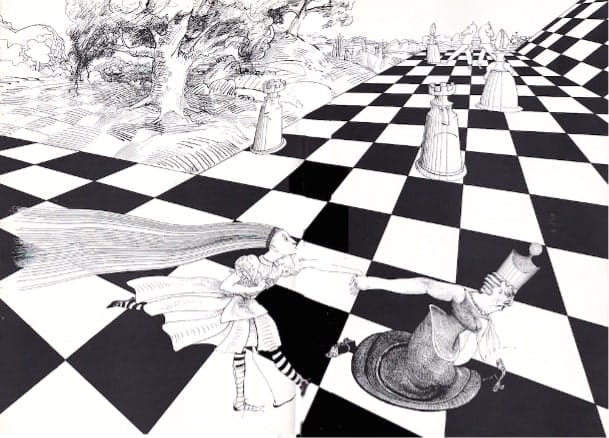
TS
I'd read Alice in Wonderland, probably freshman year in high school. I had a teacher who essentially told us, this is almost like a puzzle within a story within a puzzle. Then in college, I took a class where Alice was on the curriculum, and we read a book called The Annotated Alice. Which is, oh, my God, you can tell every word, every phrase, every sentence, every paragraph, every character. The depth of the thing is staggering to the point where you can't really even absorb it all. It's so amazing. So, I knew Alice had been written by a genius, and therefore, I was too intimidated. It’s a book that’s almost a key to a whole universe that is not there on the page. So how do you absorb that? Hats off to you for taking it in this other direction with The Looking Glass Wars.
FB
I know you're into politics, and I don't know if you've seen how many headlines there were during the Trump Administration that said “We're down the rabbit hole. We're through the Looking-glass. We're all mad here.” And Kushner just came out and said the best way to contextualize the Trump presidency was through Alice in Wonderland.
TS
Absolutely. Metaphorically, Alice in Wonderland has probably been used in that way as much as any modern text out there. It stands the test of time that way. Nothing like it has really survived, has it?
FB
Think about Winter Wonderland, and how often we're using it to describe magical places. I suppose Middle Earth or Oz, are equivalents they use a lot. But Wonderland is really part of our language.
TS
But once you get to Middle Earth, and you understand the rules, then it's consistent. Wonderland is always changing. It's always morphing. You can’t really feel grounded there. It's hard to find something like that but it's so ungrounded that people could stick with it.
FB
This is why there have been very few Alice in Wonderland adaptations that have been successful, except Tim Burton's. But the second movie didn't really work because there's not a grounded logic to the world, which is what I've attempted to do with The Looking Glass Wars. I wanted to bring a kind of Middle Earth style where there are rules and governance and logic to it.
If you were to describe your golf game using Alice in Wonderland as a metaphor, what would that be?
TS
I would have to say I'm like the Mad Hatter.
FB
You’re not Humpty Dumpty?
TS
I'm the Mad Hatter with the notion of a little bit of anger all the time.
FB
Thanks for sharing all those great stories and the ups and downs of the creative process. And congrats on your new movie. Where can where can folks see Double Down South?
TS
It's going to be at the Three Rivers Film Festival in Pittsburgh in mid-November, and then it's coming out in about 60 cities in mid-January for about a month and then it'll be on all platforms.
FB
Well, it's a terrific movie and I'm sure audiences will find it. Thanks for coming on.
TS
This was so much fun. I'm so glad you had me on the podcast.

For the latest updates & news about All Things Alice, please read our blog and subscribe to our podcast!